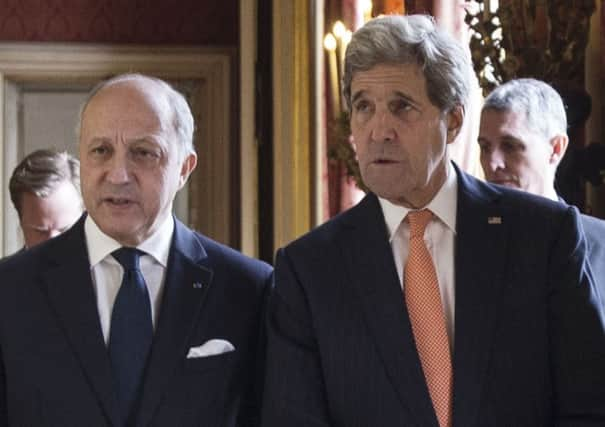Still ‘big gaps in Iran nuclear deal’ talks


“We are on the same page,” US secretary of state John Kerry said after talks with French foreign minister Laurent Fabius. “We know what we are chasing after and we are chasing after the same thing.”
Kerry and Fabius, who met the British and German foreign ministers after their session, cited progress in the talks, with the last round just wrapping up on Wednesday in Switzerland. But they also acknowledged that big gaps that must be bridged if the sides are to reach a deal by the end of the March deadline set by negotiators.
Advertisement
Hide AdAdvertisement
Hide Ad“There is progress in certain areas but there are also divergences,” Fabius said. He said more work needed to be done on the length of the proposed agreement and on how to verify Iranian compliance.
“There is still work to do on the duration, we need a guarantee and transparency is necessary,” he said.
Kerry added: “We have exactly the same assessments. We have made progress but there are gaps. We need to close those gaps.”
Yet a senior Iranian official said some roadblocks hindering an agreement had been cleared. Iran’s vice president, Ali Akbar Salehi, said technical impediments in the way of a final nuclear accord had been eliminated during ongoing discussions with US negotiators.
Salehi, who is also in charge of Iran’s nuclear agency, told Iranian state television yesterday that Tehran offered proposals to remove “fake concerns” over the country’s nuclear programme, paving the way for a final deal.
The next round of nuclear talks is set to begin on 15 March, involving mainly US and Iranian representatives. A small European delegation will also participate.
That configuration has led to some complaints that the talks involving the five permanent members of the UN Security Council, Germany and Iran have become more of an American-Iranian project.
Kerry denied such suggestions. He noted that he and Fabius would join German foreign minister Frank Walter Steinmeier and Britain’s Philip Hammond as well as the EU’s foreign policy chief, Frederica Mogherini, for more detailed discussions.
Advertisement
Hide AdAdvertisement
Hide AdKerry stressed that Iran still needs to make decisions to prove to the world it is not trying to develop nuclear weapons. Tehran claims its nuclear programme is peaceful and exists only to produce energy for civilian use.